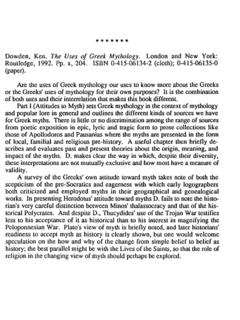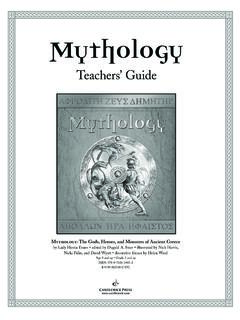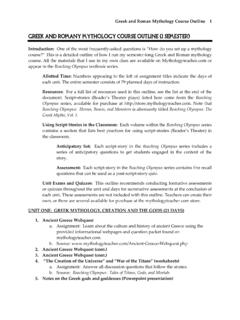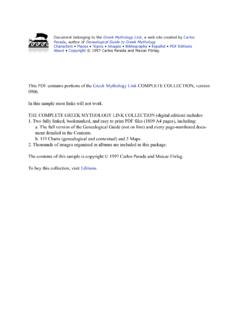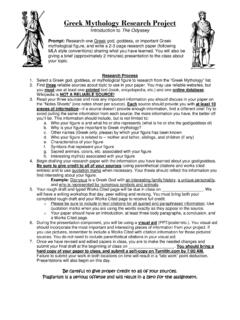Transcription of Greek Mythology - stoledo.weebly.com
1 Greek Mythology Unit Lesson Plan Stephanie Toledo Grade 4 Greek Mythology Unit Grade 4 Essential Questions: 1. How does our knowledge of Greek Mythology aid us as readers in constructing meaning from texts? 2. What meanings did myths about gods, goddesses and heroes have for ancient Greeks? 3. What meanings do the Greek myths have for us today? Unit Objectives: 1. Students will be able to analyze and describe how Greek Mythology has shaped various cultures. 2. Students will be able to explore, discuss, and explain the background and foundations for mythological stories. 3. Students will be able to apply appropriate research skills while investigating famous myths. 4. Students will be able to collect, categorize, and apply information about various aspects of Greek Mythology .
2 5. Students will be able to analyze a text for purpose and theme. 6. Students will be able to analyze a text for allusions, symbolism, and other literary devices. 7. Students will be able to apply a wide range of idea creation techniques to develop unique and innovative ideas. 8. Students will be able to exercise flexibility and willingness to be helpful in making necessary compromises to accomplish a common goal. 9. Students will be able to work effectively and respectfully with diverse teams. 10. Students will be able to develop, implement, and communicate new ideas to others effectively. 11. Students will be able to be open and responsive to new and diverse perspectives and incorporate group input and feedback into Greek Mythology Grade 4 Unit Overview The purpose of our Greek Mythology Unit is to explain the definition of Mythology and how it has influenced Greek culture.
3 I also want the students to gain an understanding of a myth and their purposes. Students will also learn about individual deities, their myths, what they represented and what we can learn from it. This unit will allow students to explore how cultures explain nature's phenomenon through stories and without the use of modern science. Students will also see how Greek Mythology has left a lasting influence in today s society through constellations, language, myths and art. This unit will also be explaining the aspect of ancient culture that will be addressed; such as the gods and goddesses worshipped, and the origins of myths. The unit would also provide a variety of opportunities for creative writing practice and allow the students to work on public speaking skills.
4 The unit is integrated with a variety of subjects that enhance the overall understanding of Greek Mythology that are also in accordance with the New Jersey State Standards and Common Core Standards. The unit Greek Mythology is composed of five different contents: art, science, social studies, language arts, and drama. Each subject is formed to include the overall Greek Mythology theme. The lessons also include more than one of the six contents in order to teach the overall subjects. For example the Greek Vases, encompasses both social studies (through teaching about the cultural uses of the vases) and art (by having students recreate an Athenian Vase). Many of the lessons in the unit continued over a few days to be included in other subjects of study.
5 An example of a connected lesson that continued into multiple days is the 12 Tasks of Hercules Project. This projects requires reading, analysis, writing, and drama. To insure the student's have an efficient amount of time to complete the task ,they are granted two full class periods to work. Each lesson composes elements of multiple intelligences and is hands-on. Formative assessments can be found at the end of each lesson and are designed to guarantee student understanding. This unit is to be both insightful and enjoyable! English- Grade 4 Greek Mythology : In The Beginning Lesson 1 (60 minutes) Student Understanding: Students will be able o Define what a myth is. o Understand what main ideas and themes are of the myth, "In The Beginning".
6 Material: Invitation to Greek Mythology Greek Mythology Folders "In The Beginning" Story Story analysis worksheet Activities/ Learning Experience: Hook: On Rug (15 minutes) o The day before starting this unit, give every student an "Invitation to Greek Mythology ". This invitation will tell the kids to research two Greek Gods/Goddesses. o The next day, the students will meet on the rug with their Greek Gods/Goddesses. o We will have a "group share" on the rug where everyone presents 1 out of the 2 gods/goddesses they researched for HW. o Once everyone is finished, everyone will receive a folder labeled " Greek Mythology " to hold the contents of this unit. Activities: At Desks (40 minutes) o Distribute "In The Beginning" handout to each student.
7 Read it together as a class. (Popcorn, pick sticks, etc.) o Watch "In the Beginning" Video o As a class, fill out the story analysis worksheet on the Smart Board. Students should follow along and fill it in as we go. Discuss characters, themes, purpose of story, etc. Made sure to use textual support! Closing/Assessment : At desks (5 minutes) o All worksheets go into " Greek Mythology " Folder o "What Stuck With You?" On a sticky note, name one Greek God/Goddess and something new you learned about them. Where they a Titan or Olympian? Common Core/ State Standards: o Refer to details and examples in a text when explaining what the text says explicitly and when drawing inferences from the text. o Determine a theme of a story, drama, or poem from the details in the text; summarize the text.
8 O Determine the meaning of words and phrases as they are used in a text, including those that allude to significant characters found in Mythology ( Herculean) o Engage effectively in range of collaborative discussions (one-on-one, in groups, and teacher-led) with diverse partners on grade 4 topics and text, building on other's ideas and expressing their own clearly. English- Grade 4 Greek Mythology : Gods and Goddesses Lesson 2 (60 minutes) Student Understanding: Students will be able o Know who the Greek Gods are o Show the relationship between the Gods and Goddesses o Choose the best statements that apply to each God and Goddess o Tell which characters and situations are more important, moral, better, logical, valid, appropriate, or inappropriate.
9 Material: Meet the Greek Gods/ Goddesses Story Gods and Goddesses Family Tree Sample- Gods and Goddesses Family Tree "Next God/Goddess of Olympus" Worksheet Activities/ Learning Experience: Hook: On Rug (5 minutes) o Students will meet on the rug and discuss what we remember from yesterday. ("In the Beginning" Myth) Ask them which gods/ goddesses they remember. o Explain that today, they will be learning about more Greek Gods and Goddesses. Some are good, and some are bad. Activities: At Desks (50 minutes) o Distribute " Greek Gods and Goddesses" handout to each student. o Working in desk groups, every group will be given a god/goddess. They will then make a character poster. It should contain their god's name, power, a picture of the god, whether they are good/bad, and who they are related to.
10 O Every group will present their character. o Then we will watch the "Gods and Goddesses" Video ( ) o Hand out Greek Family Tree and explain the project. Closing/Assessment : At desks (5 minutes) o Have students complete the "Next God/Goddess of Olympus" Worksheet as an exit slip. o To review who is who, they will complete a Greek Family Tree (To be completed for homework) Common Core/ State Standards: o Refer to details and examples in a text when explaining what the text says explicitly and when drawing inferences from the text. o Determine a theme of a story, drama, or poem from the details in the text; summarize the text. o Describe in depth a character, setting, or event in a story or drama, drawing on specific details in the text o Determine the meaning of words and phrases as they are used in a text, including those that allude to significant characters found in Mythology ( Herculean) o Engage effectively in range of collaborative discussions (one-on-one, in groups, and teacher-led) with diverse partners on grade 4 topics and text, building on other's ideas and expressing their own clearly.

